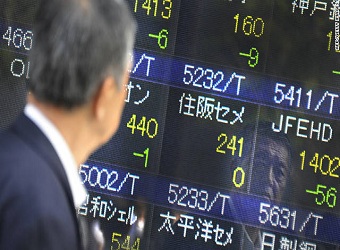Asian markets were negative on Tuesday following the sluggishness in global equities amid risk-off sentiment.
Spot gold- viewed as a safe-haven asset, was trading at $1,233.56 per ounce- up for the fifth straight session and at a three-month high.
The Japanese yen- another safe-haven play due to its large current account surplus- has appreciated strongly against major currencies.
“Investors are nervous about the economy and President Trump’s policies,” said Kathy LIen, managing director of FX strategy for BK Asset Management, in a late Monday note.
“Trump has been on a campaign to pressure other countries to strengthen their currency which effective means he wants the dollar to weaken,” Lien added.
The yen was fetching 111.68 per dollar in early Asian morning, falling below the 112 handle yesterday. Against the euro, the yen traded at 119.75, versus levels above 121 seen last week.
U.S. Treasurys also saw increased buying, with the yield on the U.S. 10-Year Treasury notes down to 2.393 percent, compared to levels around 2.411 percent earlier. The Treasury yieids move inversely to the price.
The Reserve Bank of Australia kept interest rates unchanged at a record low 1.5 percent on Tuesday, with the accompanying statement suggesting that the central bank may be on hold for some time.
The Australian dollar climbed after the announcement to trade at $0.7671.
Australia’s S&P/ASX 200 fell 0.12 percent, weighed by its financials component which was down 0.97 percent, and its energy component, which fell 0.37 percent.
The benchmark index’s gold sub-index outperformed, up 3.64 percent as gold prices surge.
Over in New Zealand, the Reserve Bank of New Zealand Governor Graeme Wheeler announced that he would not be seeking a second term when his current five-year term ends in September 26.
Japan’s Nikkei 225 lost 0.2 percent on the back of continued yen strength.
Toyota Motor shares were down 2.11 percent, its lowest since November last year, after the automaker raise its operating profit forecast short of the market expectation.
The South Korean Kospi slipped 0.26 percent.
South Korea’s SK Hynix was up 0.34 percent, after it submitted an initial bid to acquire a stake in Toshiba’s memory chip business.
After the news, Toshiba shares fell 0.17 percent. The Japanese conglomerate is making its core memory chip business a separate company and seeking outside investment, as it faces a multi-billion dollar write-down for its U.S. nuclear construction business.
China’s Shanghai composite was off 0.31 percent and Shenzhen composite was up just 0.22 percent. Hong Kong’s Hang Seng index fell 0.16 percent, paring back yesterday’s gains of more than 0.9 percent.
U.S. stocks fell on Monday, dragged by a drop in oil prices amid uncertainty over U.S. President Donald Trump’s policies.
The Dow Jones industrial average was down 0.09 percent to close at 20,054.42, the S&P 500 index fell 0.21 percent to end at 2,292.56, while the Nasdaq composite finished down 0.06 percent at 5,663.55.
European equities were also lower on Monday, with the pan-European Stoxx 600 down 0.68 percent, amid political uncertainty in France sfter far-right National Front leader Marine Le pEn launched her presidential bid.
Le Pen has vowed to fight globalization and take France out of the euro zone.
In currency markets, the dollar was at 99.907 against a basket of currencies on Tuesday in Asia.
The Australian dollar traded slightly weaker at $0.7635. The euro fell against the dollar to trade at $1.0729.
Oil prices recovered from more than 1 percent declines on Monday during U.S. hours, on supply concerns and growing tensions between Washington and Tehran.
U.S. crude were up 0.28 percent at $53.16 a barrel, as Brent futures added 0.31 percent to $55.89.
Source: CNBC
